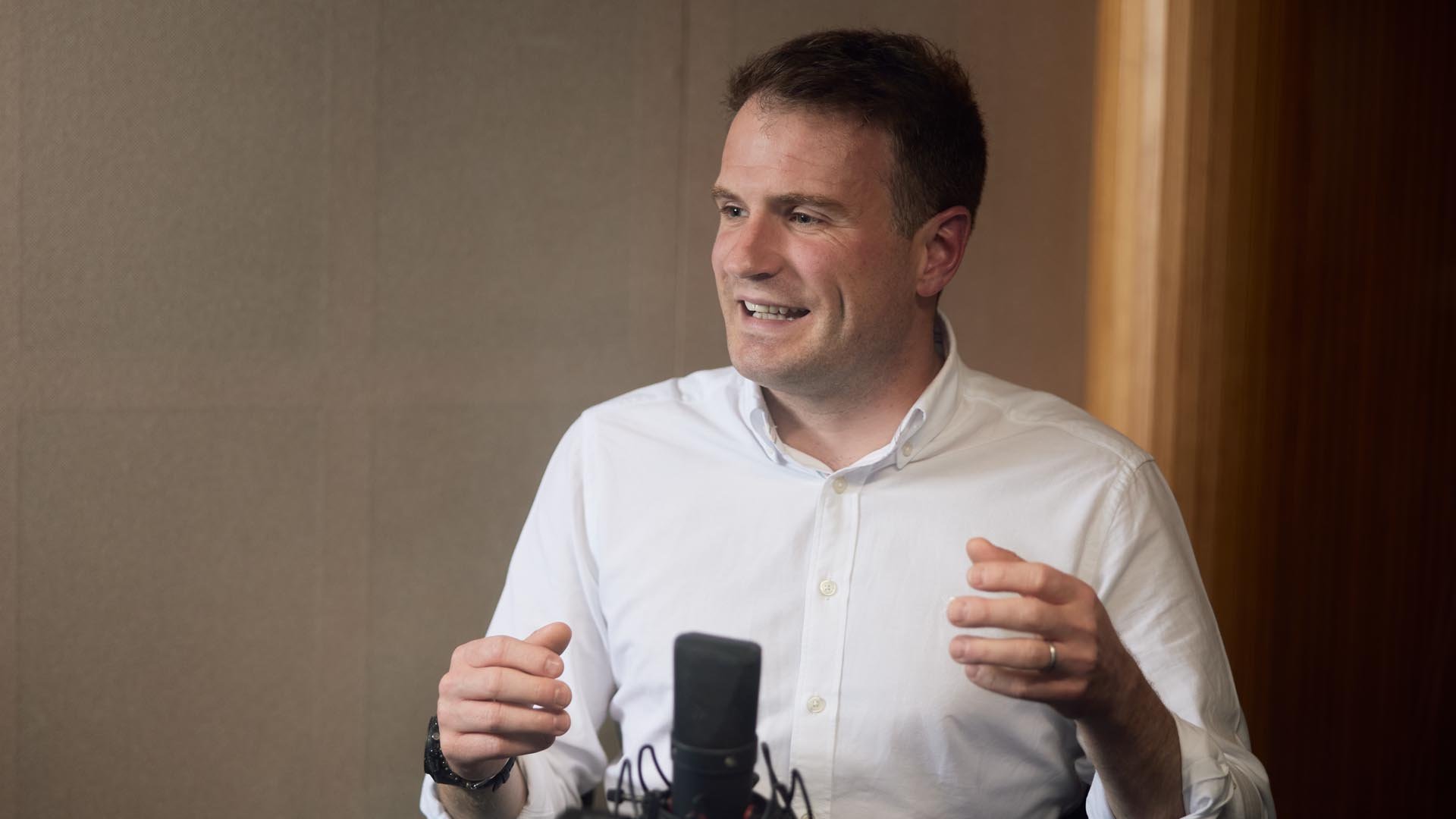
Illustration by Andrew Lyons
Please remember that the value of an investment can fall and you may not get back the amount invested. This article originally featured in Baillie Gifford’s Autumn 2022 issue of Trust magazine.
In Israel, the biblical land of milk and honey, they’re learning how to make milk without cows.
I know this because I heard it from an actual ‘professor of lactation’ at Biomed Israel 2022 in Tel Aviv. Nurit Argov-Argaman is the founder and chief technology officer of the biotechnology company Wilk. She was speaking in the food technology session of the country’s annual life sciences conference. Her talk on cell-cultured milk was intriguing, so I followed it up.
All the presentations at Biomed are primarily aimed at scientists and technologists. It was flagged to me by a biotech company I was looking into, and in the few years I’ve been going, I’ve been the only international investor present, as far as I know. This is leading-edge science and things can get quite technical quite quickly. But generally, the companies use their 25 minutes to explain how they’re tackling global problems.
These are often businesses that will eventually list in New York, where there is a bigger pool of investment capital to dip into. So, in some ways, I see research in Israel as looking for exciting US companies outside the US. And Israel having such a relationship-based culture means people are always making suggestions and introductions. The more time you spend there, the more opportunities you find. After three weeks, I’d met senior people from more than 20 interesting companies, with many others to follow up.
Take Wilk, for example. Coverage of bioengineered food tends to focus on lab-grown meat. But Prof Argov-Argaman has spent her career studying how to bioengineer the milk fat globule and the complex health benefits of cow milk and human breastmilk, which many see as superior to plant-based alternatives.
Israel already breeds the world’s most productive dairy cows, but being able to reproduce the biochemistry of milk would have vast benefits.
It could help meet the expected surge in demand for milk products as disposable income rises worldwide while reducing the impact of dairy farming on the environment and animal welfare.
With the human variety, it could replace infant formula with something closer to breastmilk, which would help premature and low-birth-weight babies.
Recreating the fundamentals of life in the lab is characteristically Israeli. From day one, the nation’s founders knew that survival in a desert land, without the possibility of open trade with its neighbours, would be achieved through science and technology.
It’s one reason why innovation, from agriculture to software, doesn’t stay locked up behind the walls of academic institutions. When scientists discover something, they’re hungry to get out there and exploit the innovation. And when you combine this historic hi-tech focus with the power of the internet to slash distribution costs and offset Israel’s isolation, the country seems well positioned to compete globally.

This year I learned more about the crucial role played by the Israel Innovation Authority (IIA). The state body’s job is to increase the competitiveness of Israel as a new knowledge hub. It does this through direct investment in high-risk tech innovation, making it, in effect, Israel’s largest venture capital firm, investing around $700m annually in the startup world, mainly in more capital-hungry or higher-risk industries where, unlike in enterprise software, cyber security or fintech, the private sector isn’t investing.
When new technologies have commercial potential, the IIA works with regulators to remove barriers. It sets up research labs and organises training so that resources are ready. That’s unique, I think. It encourages the formation of companies that otherwise wouldn’t appear.
Edinburgh Worldwide Investment Trust (EWIT) contains several Israeli companies, and we’re looking at others. Existing holdings include CyberArk, a software security company, JFrog, which provides tools for software developers, and Ceva, a chip designer.
But EWIT’s largest Israeli holding is Novocure, a medical devices company that targets solid tumours with electrical fields. I came across it on a previous trip. On this visit, a lab tour with the chief executive and chief science officer brought me up to date with the progress of Novocure’s trials on pancreatic, ovarian and other cancers. We discussed its new partnerships with pharma giants Merck and Roche in combination therapies that promise better outcomes for patients.
Such companies, and the artificial intelligence research that the likes of Alphabet (Google’s parent company), Meta (owner of Facebook) and Amazon carry out in Israel, don’t spring from nowhere. They partly stem from the academic excellence of Israel’s globally renowned higher education institutions. The Technion Institute of Technology, the Weizmann Institute of Science, the Hebrew University of Jerusalem and Tel Aviv University are all arguably on a par with MIT in terms of tech innovation and discoveries.
Another key part of the startup ecosystem is the Talpiot, the Israel Defence Forces’ development programme for the best and brightest of the country’s physicists and mathematicians. It’s been a nursery for many prominent companies. Israel’s sizeable defence budget accounts for its leading position in fields such as cyber security, radar technology and computer vision – artificial intelligence that lets machines ‘read’ images.
Reminders of security priorities are never far away. I’ve got used to people carrying guns in the street, and bosses casually pointing out their windowless bomb shelters.
On this trip, I was chatting with a company founder at his home on the slopes of Mount Tabor by the Sea of Galilee when our conversation was drowned out by the screech of fighter jets. It sounded ominous, but he shrugged: “Oh yeah, you don’t speak Hebrew. You won’t have heard on the news that the F35s are training today.”
The heightened military alertness that sped Israel down the hi-tech road has also fostered a relationship-driven, communal culture in a country made up of immigrants from everywhere.

To experience this camaraderie in microcosm, visit Tel Aviv’s Carmel Market. As a foodie – and an obsessive baker – I can vouch for it as street food heaven. The braided challah bread and other amazing foods probably added 5kg to me.
Go to Carmel on a Friday lunchtime when everything’s open and everyone’s enjoying themselves. As a Bulgarian, I’m more used to people eating and socialising outdoors than they do in the UK. But this was crazy: huge families sitting down for marathon lunches. You’re a bit of an outlier if you’re on your own in this environment, and people will come and say hi.
Walking down the street, you get the sights and smells of a Yemeni restaurant next to an Ethiopian restaurant next to a Polish restaurant. It strengthens the sense of a society where diverse peoples have been thrown together in a small country and mostly found a way to co-exist.
One final note on food experiences: I didn’t taste the lab-produced milk I mentioned at the start, but I did taste a steak grown from American Angus beef cells at a company called Aleph Farms, in Rehovot. The fi rm has made remarkable progress, even if it’s not quite ready for the lunch menu at Carmel.
But it was still edible evidence that biofood is yet another frontier industry emerging from Israel’s thriving technology ecosystems and squaring up to a big global problem.
Which reminds me of a nice quote someone told me, from the late, great Shimon Peres, a former Israeli prime minister, that partly explains where these promising businesses come from:
“We’re a nation born to be discontented. Whatever exists we believe can be changed for the better.”
At the time of publication, in addition to the Edinburgh Worldwide Investment Trust, the following trusts were invested in NovoCure, which was mentioned above:
NovoCure - Monks, US Growth Trust
Investments with exposure to overseas securities can be affected by changing stock market conditions and currency exchange rates. Investments in smaller, immature companies is generally considered higher risk as changes in their share prices may be greater and the shares may be harder to sell. Smaller, immature companies may do less well in periods of unfavourable economic conditions.
The views expressed in this article should not be considered as advice or a recommendation to buy, sell or hold a particular investment. The article contains information and opinion on investments that does not constitute independent investment research, and is therefore not subject to the protections afforded to independent research.
Some of the views expressed are not necessarily those of Baillie Gifford. Investment markets and conditions can change rapidly, therefore the views expressed should not be taken as statements of fact nor should reliance be placed on them when making investment decisions.
Baillie Gifford & Co Limited is wholly owned by Baillie Gifford & Co. Both companies are authorised and regulated by the Financial Conduct Authority and are based at: Calton Square, 1 Greenside Row, Edinburgh EH1 3AN.
The investment trusts managed by Baillie Gifford & Co Limited are listed on the London Stock Exchange and are not authorised or regulated by the Financial Conduct Authority.
A Key Information Document is available by visiting bailliegifford.com





